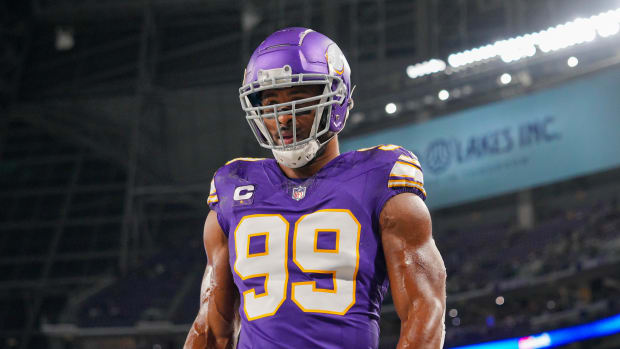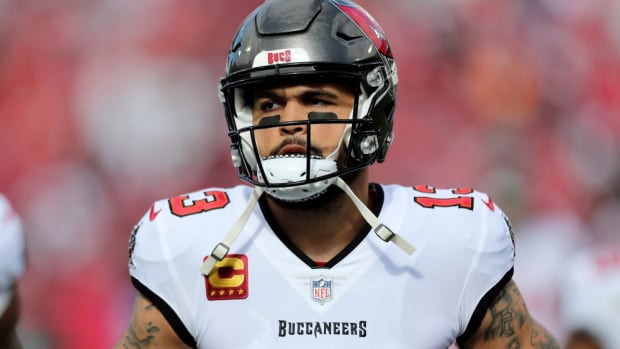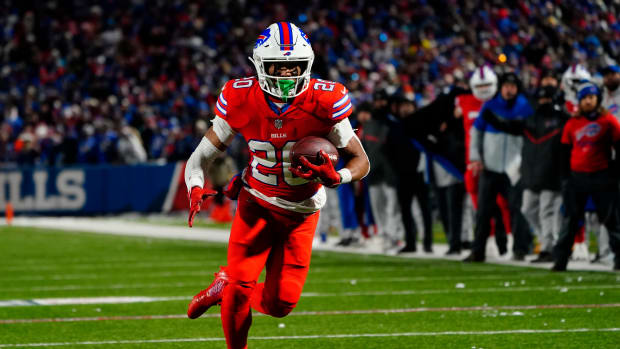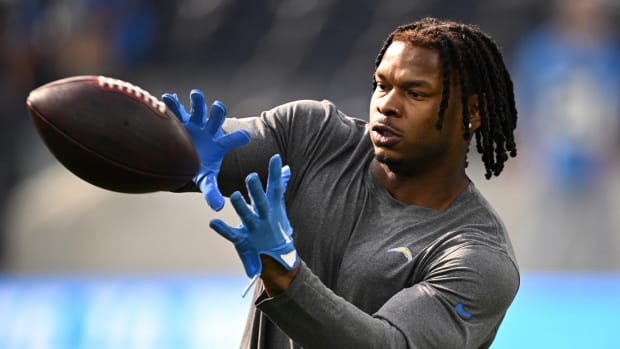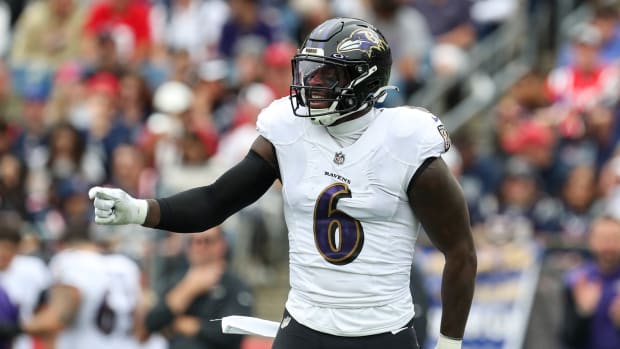
Thursday Night Football: ‘It Feels Horrible’
Brian Hoyer's torn ACL was one of 2013's most significant Thursday night injuries. (Andrew Weber/USA TODAY Sports)
There are NFL players who welcome their turn at a Thursday night game or the annual Thanksgiving Thursday slate. Some guys like the weekend off that comes after two football games in five days.
Duane Brown is not one of these players.
“It’s dangerous,” says the Texans Pro Bowl tackle. “It feels horrible.”
Brown, whose Texans visit Jacksonville on Thursday, played two overtime games back to back, on Sunday, Nov. 18, 2012 and Thursday, Nov. 22. Brown played 172 combined snaps that week, and describes a subsequent degree of pain and fatigue that he had not yet felt in four previous NFL seasons.
“That Friday, everything was hurting; knees, hands, shoulders,” he remembers. “I didn’t get out of bed until that night. I didn’t leave the house at all. You talk about player safety, but you want to extend the season and add Thursday games? It’s talking out of both sides of your mouth.”
The NFL has long played games on Thanksgiving, but its package of Thursday night games carried by NFL Network didn’t start until 2006, with an eight-game schedule. That was expanded last season to 14 games, and the NFL, with its stated commitment to player safety, sought to answer anecdotal claims of high injury rates for midweek games with an injury study. The league found that roughly the same amount of injuries happened in 2012 Thursday games (5.2 per game) as in games played on Saturday, Sunday and Monday (5.3).
It’s compelling evidence that Thursday games are no more dangerous than Sunday games, that is, if you can watch an NFL game and believe that only five or so injuries are happening in those 60 minutes. I can’t, Duane Brown can’t and neither can the chorus of players calling for the end of Thursday Night Football.
“It’s a problem,” said Broncos guard Louis Vasquez.
“I don’t like them,” says Texans wide receiver Andre Johnson. “I guess because they don’t play in the league office, they don’t understand how your body feels.”
That’s probably true. Most of the suits who bargained for an expanded Thursday slate don’t know what it feels like to play in the NFL. Here’s what they do know: Money. There is a big TV market for an eight-game package of Thursday games, which the NFL is expected and free to sell off now that its cable arm has 14 in its possession, thanks to the new collective bargaining agreement, approved by the NFLPA in 2011. Part of the expansion of the Thursday night schedule was to ensure competitive balance, with each team having to play on the short week once, but that was likely a secondary concern to the revenue selling the Thursday package would create.
How big is the market for that package? Let’s ask John Ourand, who covers the topic for Sports Business Daily.
“What I’ve heard, is that if you take an eight game package of Thursday night games to the market, you’ll have Turner, Fox, NBC, after it and ESPN waiting to see how high the prices would go. So you’d have four bidders. And it could go broadcast beyond that.
“People believe that such a package could bring in about $700 million a year. And the NFL would keep half of the games in order to maintain the value of NFL Network."
You have Houston and Jacksonville, which no one is looking forward to ... and it will be one of the top 5 or 10 shows on TV. The power of the NFL and why they want to go to Thursday is more evident in this game than in any other.
That’s $700 million, $65 million less than the price the NFL paid the army of former players who sued over a half century of misinformation and mishandling of concussions. In essence, the NFL could and likely will recoup the losses suffered as a result of their historically cruel and obtuse injury practices, by selling off a product that many players believe puts their bodies at extended risk.
And the players don’t express these concerns with any illusions that things will change. They know they are cogs in the machine; brilliantly paid cogs, but cogs all the same. The best they can do is look at the schedule the day it’s released and hope their Thursday night game is at least early in the season, not now, in December, when players are recovering from sprained ankles and twisted knees and head trauma. As Vasquez says, “Some guys are asked to push through the pain.”
“We were lucky to get ours done early,” said Chiefs lineman Geoff Schwartz. “When I saw the schedule come out it was awesome. You can recover in Week 3. Now, I don’t actually feel good until about Saturday.”
Says Packers defensive lineman Ryan Pickett: “People don’t know this; after the game, it’s normally Friday and Saturday when your body starts feeling better. I’ve been around for 13 years, so it takes a little longer to recover.”
Putting aside for a moment the injury concerns, who would actually want to watch these 14 games featuring fatigued players, often pitting bad teams against good ones, or worse, the 2-10 Texans vs. the 3-9 Jaguars (8:25 PM ET, Thursday, NFL Network)?
Answer: EVERYBODY.
“You have Houston and Jacksonville, which no one is looking forward to,” Ourand says, “but even that game is going to win the night on cable within the male demographics everybody sells, and it will be one of the top 5 or 10 shows on TV. The power of the NFL and why they want to go to Thursday is more evident in this game than in any other.”
It’s the kind of power it takes to write a check for $765 million and keep it moving, because the owners weren’t throwing pennies in a well when they bargained for a flattening salary cap, a lowered rookie wage scale, and 14 games of midweek football. Who cares if some anonymous special teamer fighting for a job pushes himself to play with a concussion three days earlier than he would have? These men are privileged to bleed for us.

































